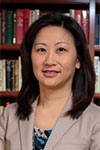 Healing Body and Soul
Healing Body and Soul
David S. Schaff Lectures 2026
April 21, 2026, 6:00 p.m. ET
First Presbyterian Church
Youngstown, Ohio
April 22, 2026, 4:00 p.m. ET
Pittsburgh Theological Seminary
Keynoter: Esther Chung-Kim
In early modern Europe, physicians studied the natural world, including plants and herbs, to better understand their medicinal qualities and ways they could be used to treat diseases or maintain health. What is less well known is that one of their motivations for studying nature was a belief that God had included the means of healing human diseases with the structure of a divinely created universe. For this reason, some physicians in 16th-century Europe turned to an unexpected source in their study of medicine: the Bible.
Full of healing stories, the Bible provided support for various treatments and therapeutic methods. In the process of studying the Bible, healers not only gleaned medical observations but also moral lessons, both of which they recorded in their medical manuals. Some physicians, like Dutch physician Levinus Lemnius, linked botany and theology, highlighting the idea that divine intervention is an important part of healing and that the natural world is God’s providence for the cure of diseases. Dr. Chung-Kim's study of these medical publications demonstrates that medical knowledge fulfilled multiple functions, ranging from popularizing home remedies for common ailments, offering guidance for preventive care, to explaining the ways that supernatural forces work through the natural world, all for the sake of healing.
Registration
Two different registrations, please be aware of the date and location:
April 21 at First Presbyterian Church, Youngstown Registration
About the Presenter
 Esther Chung-Kim specializes in the history of world Christianity, especially Europe and Asia. Her research examines religious conflict, history of poverty, and religious influence on politics, economics, and society in the early modern era. She regularly teaches courses on the history of world Christianity, poverty, wealth and social change, European Reformations, and Christianity and politics in East Asia. She has written Inventing Authority: Reformation Debates over the Eucharist (2011), which explores the question of religious authority in the midst of conflict. She has co-edited The Reformation Commentary on Scripture: Acts (2014), an important contribution to the history of biblical interpretation. Her most recent book, Economics of Faith: Reforming Poor Relief in Early Modern Europe (Oxford University Press, 2021) examines the role of religious reformers in the development of social welfare institutions. Recent journal articles and essays include: "Working Women in Poor Relief: Midwives, Nurses and Deaconesses," in Women Reformers in Early Modern Europe (2022); "Pious City: Community and Charity in Calvin's Geneva," (2022) in Archive for Reformation History 113:1 (2022); and "Reforming Church and Society in Denmark," in Lutheranism and Social Responsibility (2022), “‘Organized Efforts to Education and Elevate’: Charitable Aid Among Christian Abolitionists,” in Awakening to Justice: Voices from the Abolitionist Past (2024), and “Cost of Practicing Religion,” in On Earth as in Heaven? Liturgy, Materiality, and Economics (2025).
Esther Chung-Kim specializes in the history of world Christianity, especially Europe and Asia. Her research examines religious conflict, history of poverty, and religious influence on politics, economics, and society in the early modern era. She regularly teaches courses on the history of world Christianity, poverty, wealth and social change, European Reformations, and Christianity and politics in East Asia. She has written Inventing Authority: Reformation Debates over the Eucharist (2011), which explores the question of religious authority in the midst of conflict. She has co-edited The Reformation Commentary on Scripture: Acts (2014), an important contribution to the history of biblical interpretation. Her most recent book, Economics of Faith: Reforming Poor Relief in Early Modern Europe (Oxford University Press, 2021) examines the role of religious reformers in the development of social welfare institutions. Recent journal articles and essays include: "Working Women in Poor Relief: Midwives, Nurses and Deaconesses," in Women Reformers in Early Modern Europe (2022); "Pious City: Community and Charity in Calvin's Geneva," (2022) in Archive for Reformation History 113:1 (2022); and "Reforming Church and Society in Denmark," in Lutheranism and Social Responsibility (2022), “‘Organized Efforts to Education and Elevate’: Charitable Aid Among Christian Abolitionists,” in Awakening to Justice: Voices from the Abolitionist Past (2024), and “Cost of Practicing Religion,” in On Earth as in Heaven? Liturgy, Materiality, and Economics (2025).
Questions
Please contact or call 412-924-1345.
About the Schaff Lectures
The Schaff Lecturers are named for David S. Schaff, who taught church history for 23 years at Pittsburgh Theological Seminary and is best known as co-editor of the Schaff-Herzog Encyclopedia. The lectures, which are intended to be academic in nature, occur over a two- or three-day period. A unique feature of the series is that some of the presentations take place in nearby Youngstown, Ohio, in collaboration with the Mahoning Valley Association of Churches.
The late Jane Booth Schaff (Mrs. Philip H. Schaff), 1894-1981, came from a family with historic ties to theological education. For 23 years, her father-in-law, Professor David S. Schaff, taught church history at Western Theological Seminary. Western is one of the antecedents of Pittsburgh Theological Seminary. Before beginning his teaching duties in 1903, he held two pastorates.
In her will, Mrs. Schaff provided for the completion of the endowment of the previously established David S. Schaff Lectureship at Pittsburgh Theological Seminary, with an important stipulation and addition that the Schaff Lecturer(s) would deliver one address in Youngstown. This was a unique concept, bringing a world renowned lecturer to the Mahoning Valley for religious and cultural enrichment. For this reason, representatives of the finest scholarship of the theological world visit Youngstown annually to participate in this program. This educational experience is open to people of all denominations and faiths and celebrates the power of words shared to create, support, and thus nurture and strengthen community. The faculty of Pittsburgh Theological Seminary select the Schaff lecturer, rotating among nine academic disciplines in theological education.
